RT02 CPCS Blue Card Renewal Mock Test with 129 Questions and Answers / A02 Crawler Crane above 10 Tonnes
£15.00 Original price was: £15.00.£9.95Current price is: £9.95.
Master Your CPCS Blue Card Renewal with Our RT02 Crawler Crane Mock Practice Test!
- Questions & Answers: based on the latest RT 02 Crawler Crane above 10 Tonnes- CPCS Renewal Test Revision FACTSHEET
- Categories: A02 – Crawler Crane
- Number of Multiple-choice Questions: 129
- Format: PDF
- Delivery time: Instant download after checkout
- Refunds: No refunds once downloaded, unless you ordered duplicates by mistake.
If there are any issues with your download, please email CardRenewalTest@gmail.com and we’ll send it ASAP
The Ultimate Study Companion for Crawler Crane Operators – RT02 CPCS Blue Card Renewal Mock Test
Are you a Crawler Crane operator looking to renew your CPCS Blue Card? Has your CPCS card expired, or are you aiming to extend it for another 5 years? We’ve got your back! Introducing our RT02 Crawler Crane CPCS Blue Card Renewal Mock Practice Test – your key to acing the renewal test and securing your CPCS Blue Card extension.
Why Renewal Matters
Renewing your CPCS Blue Card is crucial for staying compliant with industry standards and regulations. It ensures that you, as a competent operator, are up-to-date with the latest safety protocols and operational guidelines. Additionally, an extended Blue Card enhances your employability and demonstrates your commitment to excellence in crane operation.
The Challenge of the RT02 Crawler Crane Renewal Test
We understand that preparing for the renewal test can be a daunting task. Reading through extensive texts and factsheets might not be the most engaging or effective way to study, especially if you’ve faced challenges in your previous attempts. That’s where our RT02 Crawler Crane CPCS Blue Card Renewal Mock Practice Test comes in handy!
Key Benefits of Our Mock Practice Test:
1. Targeted Preparation:
Our questions are meticulously crafted based on the latest NOCN CPCS RT02 Crawler Crane above 10 Tonnes factsheet. This means you’ll be focusing on the specific knowledge areas crucial for acing the renewal test.
2. Realistic Exam Simulation:
Experience the format and difficulty level of the actual CPCS Blue Card Renewal Test. Our mock questions closely resemble those you’ll encounter, providing a realistic exam simulation for better preparedness.
3. Learn by Doing:
Studies show that active learning through practice is more effective than passive reading. With our mock test, you’ll not only memorize information but also understand how to apply it in real-world scenarios.
4. Instant Feedback:
Receive immediate feedback on your answers. Know which questions you’ve mastered and identify areas that need improvement. This feedback loop accelerates your learning and boosts your confidence.
How to Pass Your CPCS Blue Card Renewal Test:
- Practice Regularly:
- Set aside dedicated time to practice with our RT02 Crawler Crane CPCS Blue Card Renewal Mock Test.
- Repetition is key to reinforcing your understanding of critical concepts.
- Understand Your Mistakes:
- Review the correct answers and explanations provided.
- Learn from your mistakes to avoid repeating them in the actual test.
- Focus on Weak Areas:
- Identify the topics where you struggle the most.
- Revisit those sections in the factsheet to strengthen your knowledge.
- Stay Calm and Confident:
- Familiarize yourself with the test environment and questions.
- Approach the actual renewal test with confidence, knowing you’ve prepared thoroughly.
Don’t Let Your CPCS Blue Card Expire – Renew and Excel!
Your CPCS Blue Card is a testament to your competence as a crane operator. Don’t let it expire – renew it with confidence and extend its validity for 5 more years! Our RT02 Crawler Crane CPCS Blue Card Renewal Mock Practice Test is designed to guide you on this journey.
Renew, refresh, and reaffirm your commitment to safety and excellence in crawler crane operation. The renewal test is your opportunity to showcase your expertise – seize it with our comprehensive mock practice test.
Crawler Crane Learning Points – RT02 Crawler Crane above 10 Tonnes CPCS Factsheet
Preparation and Completing Work (Preparation):
Crawler cranes are mounted on a tracked chassis with a lattice-type jib, capable of slewing through 360 degrees.
The operator must conduct pre-use checks at required intervals to ensure safe operation.
Regular thorough examinations by a competent person are mandatory, with the frequency determined by operating conditions.
Daily checks are usually undertaken by operators, while more in-depth weekly-type checks should be performed by trained personnel.
A lift plan, constructed by the lift planner/appointed person, is crucial for each lifting operation, identifying risks and mitigation measures.
Lifting Practices and Working with Others (Working Tasks):
Lifts should stay within the rated lifting capacity, and the rated capacity indicator (RCI) warns of approaching or exceeding limits.
RCIs must never be overridden during lifting operations, as it may lead to over-lifting and the risk of overturning.
The crane’s hook must be directly above the center of gravity for the load to prevent dragging and overload situations.
The rated capacity applies only to freely suspended loads, not when attached to structures or embedded in the ground.
Personnel lifting requires a specially designed carrier with considerations for checks and evacuation plans.
Lifts near public areas must be segregated, and moving suspended loads above workers or pedestrians should be minimized.
Working Safely and at Height (Working at Height):
Site conditions, overhead power lines, and wind speeds must be considered before, during, and after work.
Large-surface-area loads in high winds can lead to rope misalignment and crane movement out of radius.
Crawler cranes should be level both longitudinally and laterally for safe lifting operations.
Lateral leaning during a lift can cause instability and overturning.
Slewing with a load requires caution to avoid additional side stress and overshooting the landing place.
Rigging, Pre-Use Checks, or Reconfiguring:
Rigging and checks involve working at height, and proper access and securing of ladders are crucial.
Stability:
Effective planning of ground conditions and environmental factors is essential to prevent instability.
Ground conditions must support bearing pressure through each track, varying with jib/boom position and load weight.
Checking ground conditions before static lifting duties and when traveling is necessary to avoid instability and overturning.
Traveling with a load on uneven ground or slopes requires additional considerations to prevent load swing and overturning.
Working near edges, especially banks or trenches, requires maintaining a minimum distance to prevent ground collapse.
These learning points cover crucial aspects of crawler crane operation, safety, and stability as outlined in the RT02 CPCS factsheet. Understanding and applying these principles is vital for operators seeking CPCS Blue Card renewal.
1 review for RT02 CPCS Blue Card Renewal Mock Test with 129 Questions and Answers / A02 Crawler Crane above 10 Tonnes
Add a review Cancel reply
Related products
CPCS Blue Card Renewal Tests
CPCS Blue Card Renewal Tests
RT19 CPCS Blue Card Renewal Mock Test with 123 Questions and Answers / A19 Grader
CPCS Blue Card Renewal Tests
CPCS Blue Card Renewal Tests
RT09 CPCS Blue Card Renewal Mock Test with 112 Questions and Answers / A09 Forward Tipping Dumper
CPCS Blue Card Renewal Tests
RT60 CPCS Blue Card Renewal Mock Test with 151 Questions and Answers / A60 Mobile Crane
CPCS Blue Card Renewal Tests
RT21 CPCS Blue Card Renewal Mock Test with 129 Questions and Answers / A21 Wheeled Loading Shovel
CPCS Blue Card Renewal Tests
RT50 CPCS Blue Card Renewal Mock Test with 141 Questions and Answers / A50 Loader Securer STGO
CPCS Blue Card Renewal Tests
RT65 CPCS Blue Card Renewal Mock Test with 133 Questions and Answers / A65 Demolition Plant


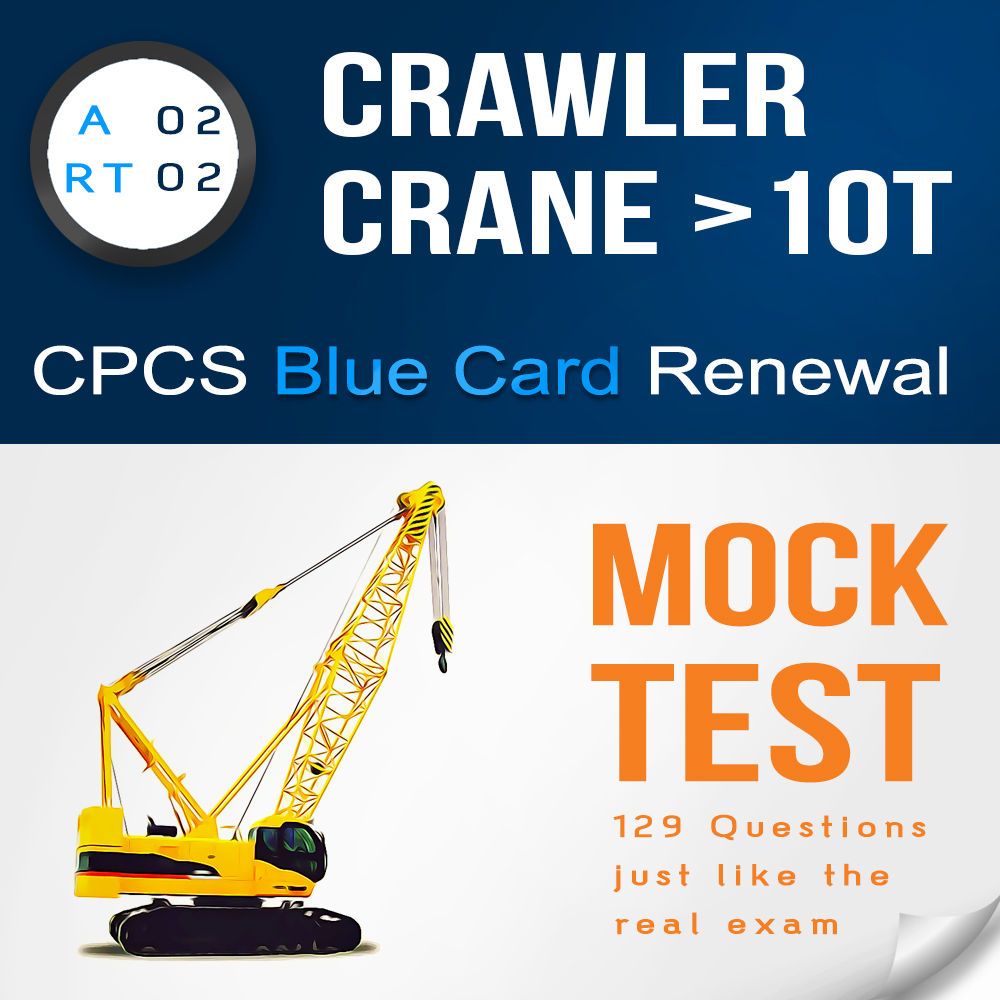

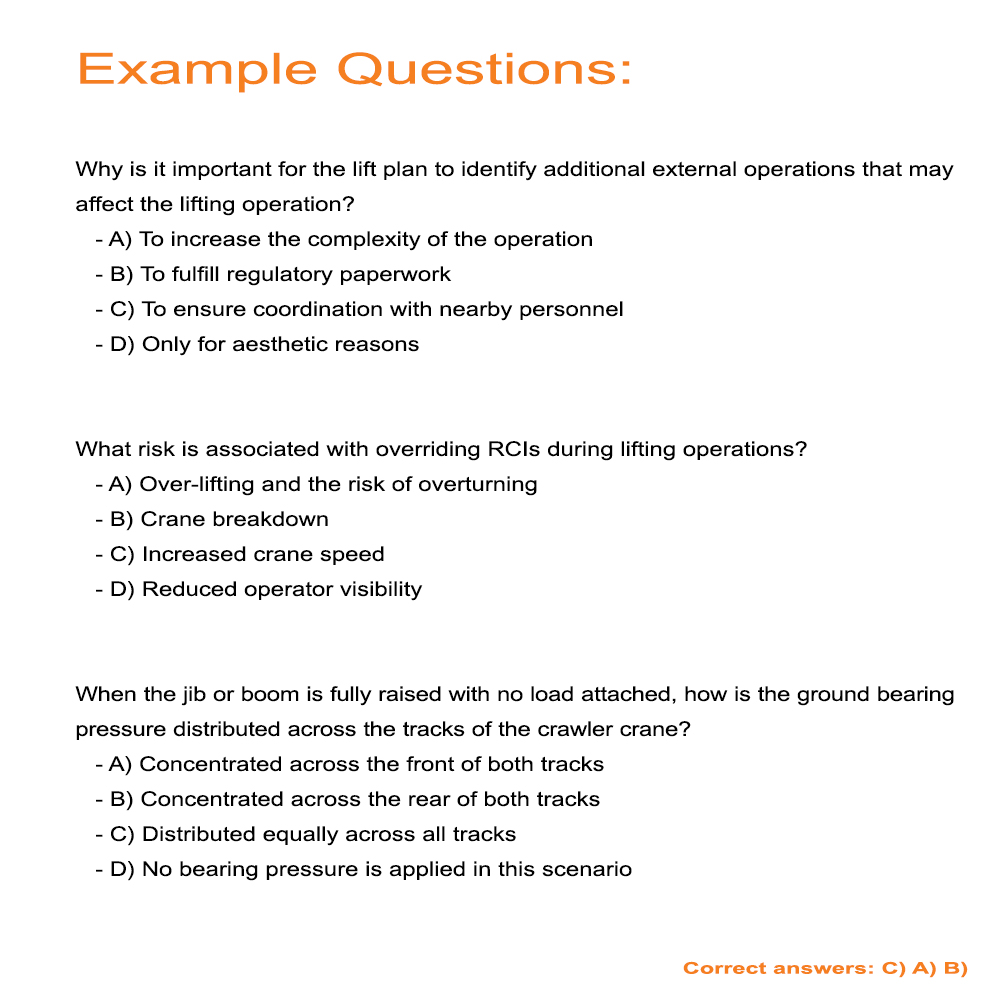
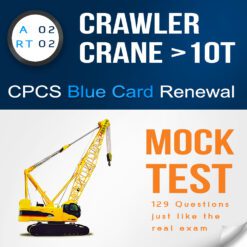



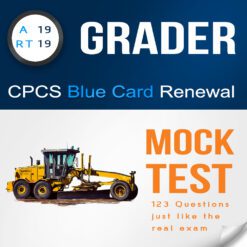


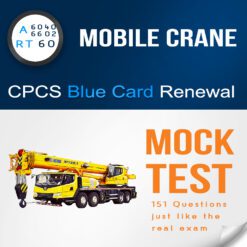
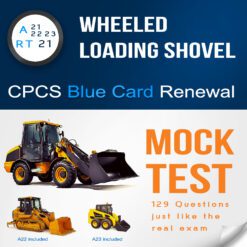
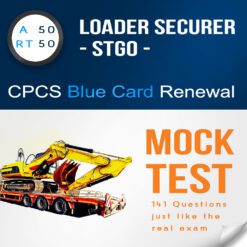

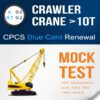
Javier Singh –
Just passed i think this helped cheers